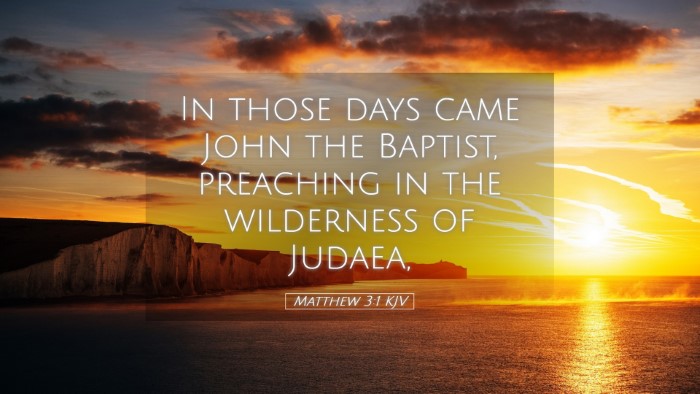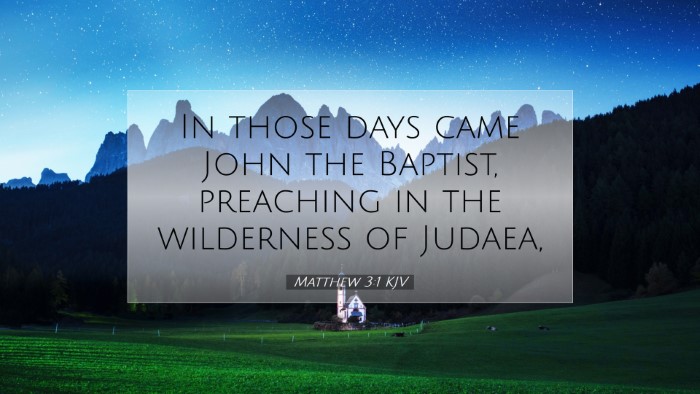Commentary on Matthew 3:1
Matthew 3:1 states: "In those days came John the Baptist, preaching in the wilderness of Judaea." This verse marks the introduction of John the Baptist, a crucial figure in the New Testament and forerunner of Jesus Christ. Below is a detailed commentary on this verse, drawing insights from various public domain commentaries.
Historical Context
The Gospel of Matthew is primarily directed to a Jewish audience, aiming to present Jesus as the prophesied Messiah. In this context, John the Baptist serves as a pivotal character who prepares the way for the ministry of Jesus. Matthew Henry notes that John's prophetic role was foretold in Isaiah 40:3—"The voice of him that crieth in the wilderness." This establishes John not only as a messenger but as one fulfilling divine promise.
John the Baptist's Role
John's emergence "in the wilderness of Judaea" signifies a place of spiritual preparation and separation from the corrupt religious practices prevalent in Jerusalem. Albert Barnes emphasizes that John's ministry took place in an area known for its desolation, symbolizing the need for spiritual renewal among the Jewish people. His call to repentance was a vital element in announcing the coming Messiah.
Importance of Wilderness
The wilderness holds significant biblical connotations. Adam Clarke observes that many prominent figures in biblical history have encountered God in wilderness settings—Moses, Elijah, and Jesus, to name a few. Thus, John’s ministry in the wilderness symbolizes a return to simplicity and a call to reflect on one’s relationship with God away from the distractions of society.
Message of Repentance
John’s preaching in the wilderness focused on repentance, a theme central to his ministry. Matthew Henry mentions that genuine repentance involves a heartfelt change, steering away from sin and towards God. John’s baptism was a baptism of repentance, preparing the hearts of the people to accept the message of the impending Kingdom of Heaven.
Preaching Style
John the Baptist’s preaching style was marked by boldness and authority. Albert Barnes notes that his straightforward proclamations reflected the urgency of God's message. The wilderness setting further magnified the starkness and authenticity of his message, drawing those who genuinely sought change in their lives.
Application for Believers
For pastors and church leaders today, John the Baptist's ministry serves as a model for calling congregants to repentance and spiritual renewal. The wilderness symbolizes a space where believers can seek God away from the distractions of contemporary life. John’s message demands a reflection on personal faith and an earnest pursuit of holiness.
Engagement with the Community
In today's context, congregations can learn from John’s example by engaging with their communities authentically. Highlighting the need for repentance and transformation can lead to revival within the church and the wider community. Adam Clarke suggests that this entails a ministry that connects deeply with the human experience, calling people to a radical change in their lifestyles.
Theological Implications
This verse represents a critical juncture in the narrative of salvation history. John the Baptist serves as a bridge between the Old Testament prophets and the New Testament fulfillment in Christ. This transition is significant for theologians as it illustrates the continuity of God’s redemptive plan throughout history.
Fulfillment of Prophecy
Understanding John’s role as a prophetic forerunner allows one to appreciate the fulfillment of Old Testament prophecies in the New Testament. Matthew’s purpose in highlighting this is to establish Jesus’ authority and identity as the Messiah, thereby deepening the faith of believers and affirming the truth for scholars and theologians alike.
Conclusion
Matthew 3:1 encapsulates the arrival of a significant prophetic voice in the wilderness, calling for transformation and preparation among the people of Judaea. The insights drawn from historical context, the profound significance of the wilderness, John's bold message of repentance, and the theological implications provide a rich tapestry for understanding this pivotal moment in biblical history. For pastors, students, theologians, and scholars, this commentary underscores the importance of repentance, authentic engagement, and faithful ministry as integral elements of the Christian faith.


